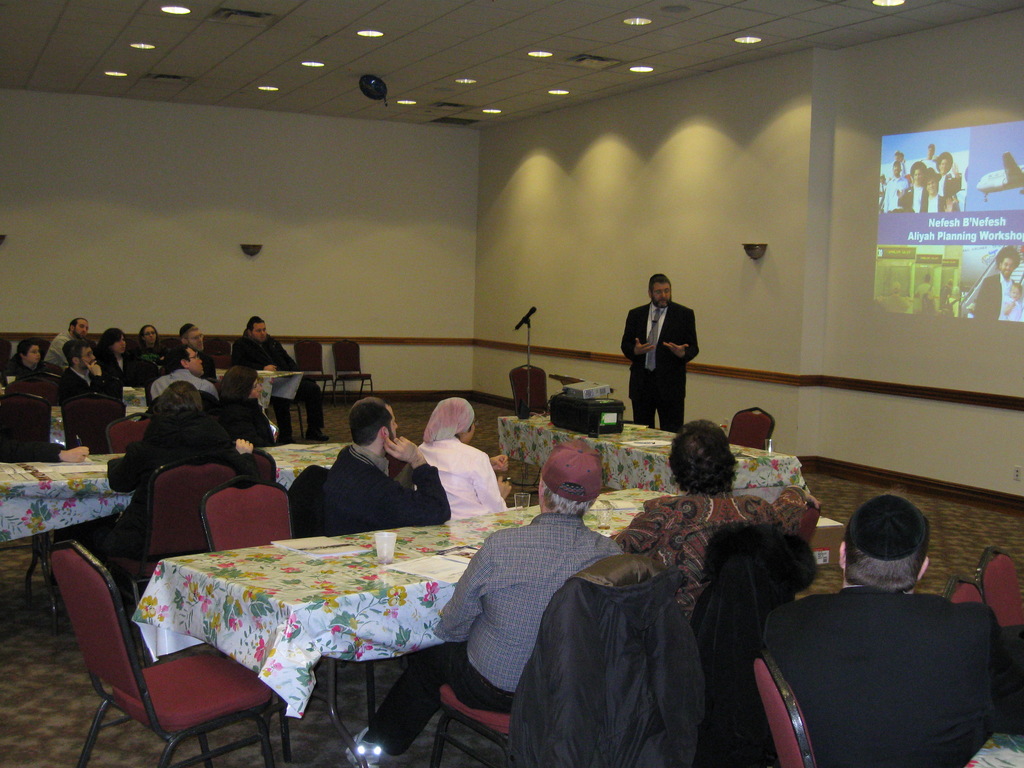Thinking of moving to Eretz Yisroel?
Nefesh B’Nefesh pitches Aliyah to the Yeshiva world
Issue of March 6, 2009 / 10 Adar 5769
Advertisements for several recent Nefesh B’Nefesh events didn’t actually contain the word aliyah. Instead, they delicately asked, ‘Are you thinking about moving to Eretz Yisroel?
One of the locations –– Lakewood –– was not previously on the Nefesh B’Nefesh (NBN) schedule. Many of the men who attended wore black and white. The events were part of a new, coordinated effort by NBN to appeal to and capture one of the rarest animals of the Aliyah movement: the Yeshivish community.
According to the founder and executive director of Nefesh B’Nefesh, Rabbi Yehoshua Fass, the project is part of the organization’s continued expansion.
NBN works to encourage Aliyah among Jews in North America and the United Kingdom by providing financial assistance, streamlining the Israeli citizenship procedure and assisting in the absorption process inside Israel.
“We are witnessing a significant interest in Aliyah from all sectors of American Jewry,” Fass told The Jewish Star, adding that NBN is working with all spectrums of Jewry, as well as targeting Jews based on work and age groups. Since 2002, Nefesh B’Nefesh has helped close to 19,000 people make Aliyah, Fass said. Many of those were Orthodox families from Nassau County, mostly of a more modern bent.
In November, NBN hired Rabbi Yigal Segal to specifically work with the Yeshivish community. Segal, who describes himself as Yeshivish, made Aliyah in August of 2005, on the first day of the Gaza withdrawal.
“I think that the yeshiva community never felt that someone understood them,” explained Segal during a brief recruiting tour to the United States. “It’s good for someone in our community to talk to someone who understands where they’re coming from.”
Close to 100 people attended an event in Flatbush two weeks ago; 40 attended a similar event in Lakewood last Sunday, said Segal.
This article has been amended to reflect a correction: There have been previous Nefesh BNefesh events in Brooklyn.
While it would be wildly inaccurate to describe the yeshiva community in general as anti-Zionistic in the way that say, Neturei Karta is (small groups of picketers from that fringe Chassidic group were present outside both events), it is fair to say that a cultural chasm exists between the Aliyah experiences of the more right-wing Yeshiva community and other Orthodox Jews.
“Rabbis in the shuls of the right-wing people are not pushing it,” Segal asserted. “The principals and the schools are not pushing it.”
There are fears of army service and of cultural differences. But Segal believes members of the yeshivish community who might otherwise contemplate a move to Israel are also scared about what effect that might have on their children.
“The Yeshivish community is afraid that if they move their children [to Israel], their children will become drug addicts, because the stories that they’re hearing are all horror stories,” said Segal bluntly. This problem, he maintains, isn’t specifically an Israeli problem.
“There are kids here [in America] that are doing badly in school, who are dropping out and becoming kids at risk [of drug abuse and other negative aspects of the secular culture]. My message to people is you really need to know your issues and every kid is different.”
When Segal and his family made Aliyah, many yeshivish people they encountered were not supportive, he added. “They thought we were crazy.” He hopes to help encourage a change in attitude.
Most Yeshivish families who make the move, according to Segal, settle in Ramat Beit Shemesh, Har Nof and Beitar.
In 2008, 3,150 people made Aliya from North America according to Israeli National News, almost double the number of North Americans who made Aliyah in 2000.

 55.0°,
Overcast
55.0°,
Overcast 




